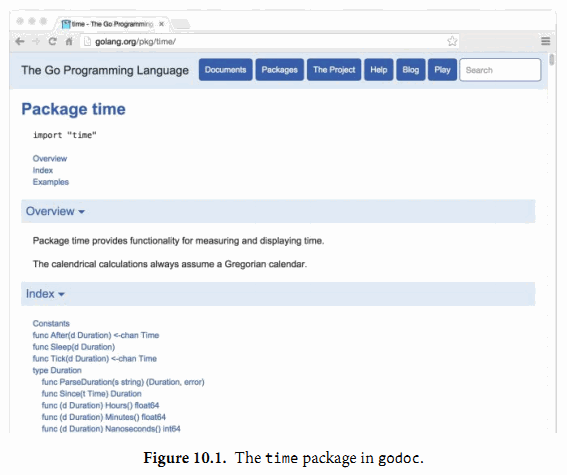3.4 KiB
10.7.4. 包文档
Go语言的编码风格鼓励为每个包提供良好的文档。包中每个导出的成员和包声明前都应该包含目的和用法说明的注释。
Go语言中的文档注释一般是完整的句子,第一行通常是摘要说明,以被注释者的名字开头。注释中函数的参数或其它的标识符并不需要额外的引号或其它标记注明。例如,下面是fmt.Fprintf的文档注释。
// Fprintf formats according to a format specifier and writes to w.
// It returns the number of bytes written and any write error encountered.
func Fprintf(w io.Writer, format string, a ...interface{}) (int, error)
Fprintf函数格式化的细节在fmt包文档中描述。如果注释后仅跟着包声明语句,那注释对应整个包的文档。包文档对应的注释只能有一个(译注:其实可以有多个,它们会组合成一个包文档注释),包注释可以出现在任何一个源文件中。如果包的注释内容比较长,一般会放到一个独立的源文件中;fmt包注释就有300行之多。这个专门用于保存包文档的源文件通常叫doc.go。
好的文档并不需要面面俱到,文档本身应该是简洁但不可忽略的。事实上,Go语言的风格更喜欢简洁的文档,并且文档也是需要像代码一样维护的。对于一组声明语句,可以用一个精炼的句子描述,如果是显而易见的功能则并不需要注释。
在本书中,只要空间允许,我们之前很多包声明都包含了注释文档,但你可以从标准库中发现很多更好的例子。有两个工具可以帮到你。
首先是go doc命令,该命令打印其后所指定的实体的声明与文档注释,该实体可能是一个包:
$ go doc time
package time // import "time"
Package time provides functionality for measuring and displaying time.
const Nanosecond Duration = 1 ...
func After(d Duration) <-chan Time
func Sleep(d Duration)
func Since(t Time) Duration
func Now() Time
type Duration int64
type Time struct { ... }
...many more...
或者是某个具体的包成员:
$ go doc time.Since
func Since(t Time) Duration
Since returns the time elapsed since t.
It is shorthand for time.Now().Sub(t).
或者是一个方法:
$ go doc time.Duration.Seconds
func (d Duration) Seconds() float64
Seconds returns the duration as a floating-point number of seconds.
该命令并不需要输入完整的包导入路径或正确的大小写。下面的命令将打印encoding/json包的(*json.Decoder).Decode方法的文档:
$ go doc json.decode
func (dec *Decoder) Decode(v interface{}) error
Decode reads the next JSON-encoded value from its input and stores
it in the value pointed to by v.
第二个工具,名字也叫godoc,它提供可以相互交叉引用的HTML页面,但是包含和go doc命令相同以及更多的信息。图10.1演示了time包的文档,11.6节将看到godoc演示可以交互的示例程序。godoc的在线服务 https://godoc.org ,包含了成千上万的开源包的检索工具。
你也可以在自己的工作区目录运行godoc服务。运行下面的命令,然后在浏览器查看 http://localhost:8000/pkg 页面:
$ godoc -http :8000
其中-analysis=type和-analysis=pointer命令行标志参数用于打开文档和代码中关于静态分析的结果。
